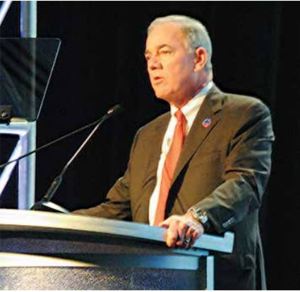AFPM leaders tout industry progress, Harvey recovery efforts
By ADRIENNE BLUME, Hydrocarbon Processing
Opening Monday morning’s General Session, Valero Energy’s President, Chairman
Overcoming Harvey
Mr. Gorder also spoke to the effects of Hurricane Harvey in August 2017, which caused massive flooding along the Gulf Coast and in southeastern Texas, notably Houston. He noted that many in the room had been impacted by the disaster, including businesses, homes
Gorder also praised the US refining and petrochemical industry for bringing capacity back online in a few short weeks after the hurricane. Approximately 25% of the country’s total refining capacity and approximately 26% of its total petrochemicals capacity were shut down by the storm.
“We always hope for the best but plan for the worst,” Mr. Gorder said. “But we all came together and we helped each other, and I want to thank you for what you did, and for everything that you do.” He also reminded the audience about a second general session, held on Monday afternoon, to address lessons learned from Hurricane Harvey and how the industry can improve in terms of preparedness and recovery.
In closing, the Valero chief said, “My hope is that when you leave this Annual Meeting, you’ll feel good about your contribution to the industry.”
Policy progress
Following Mr. Gorder’s remarks, AFPM President and CEO Chet Thompson addressed attendees. Thompson called the Annual Meeting’s host city, New Orleans, a “shining example of resilience” after Hurricane Katrina, which devastated the city in August 2005.
“Resiliency is something our industry knows a little about, too,” Mr. Thompson said. “Over the years we’ve evolved, we’ve gotten stronger, more productive, more efficient and cleaner, and we will continue to do so.” Mr. Thompson noted that in 2017, US refinery utilization was close to 90% for the third straight year.
Additionally, $25 B of investment was made in the US refining and petrochemicals sector last year, and nearly $150 B of investment are in
The AFPM head then spoke about the state of the US government’s tax reform. “Last year, we thought [tax reform] was a pipe dream, but it wasn’t,” he said. The realized tax reform has enhanced US industry’s ability to invest money in infrastructure and people. “This is where your money needs to go,” Mr. Thompson urged. “Finally, we can look to the government for support, rather than resistance.” He also discussed the “eventual sunset” of Renewable Fuel Standard (RFS) regulations, which he called “bad for industry, consumers and the country.” However, he noted that “productive discussions are happening” to put an eventual end to the subsidies.
The AFPM head also spoke to the need to streamline permit approvals for infrastructure projects, noting, “Reforms do not mean limiting environmental protection.” He also touted AFPM’s support of the North American Free Trade Agreement (NAFTA) between Canada, Mexico
AFPM Leadership Award
Mr. Thompson also presented the first AFPM Leadership Award, given for extraordinary contributions to the advancement of the American fuel and petrochemical industries, to Congressman and Majority Whip Steve Scalise (R-LA). Mr. Scalise, who took the podium to thank AFPM for the award, noted that EPA regulations have affected the industry’s ability to grow, expand and make more jobs. He also touted the current presidential administration for reversing roadblock regulations. “Safety is critical, but when you have regulations that make no sense, they actually do things to decrease your ability to operate safely and hire more people,” Mr. Scalise said. He also noted that the recent tax reforms—the first since 1986—have lowered individual tax rates as well as corporate rates, and have also led some companies to give higher bonuses to employees. “Tax reform has allowed companies to become competitive again,” the Congressman said. “Now, we not only have a stable regulatory climate, but we also have a tax code that works for you.”







Comments